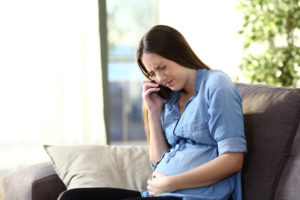Once they are discovered, you can expect to see the doctor more often because there may be some fibroid factors that increase your risk of complications during pregnancy.
What Are the Risks?
Fibroids are non-cancerous growths that develop inside of the uterus, outside of the uterus, or within the uterine wall itself. They can be very tiny or as large as a grapefruit, so once your doctor determines the size(s) and location of the fibroid(s), they can give you an idea of any particular risks associated with them. If a fibroid is larger than 5 centimeters there can be additional abdominal pain during pregnancy and an increased urge to urinate more frequently.
Most women with fibroids will experience little to no effect during their pregnancy. However, up to one-third of women with fibroids may experience some increased risks and complications during their pregnancy and delivery.

Fetal Growth Restriction or Retardation
Intrauterine growth restriction or IUGR refers to a fetus that does not develop at the normal rate. The fetus is smaller than normal compared with other fetuses of the same gestational age. This term is also used when a child is born less than 5 pounds 8 ounces.
Preterm Delivery
One particular fibroid factor relates to pain from the fibroids during pregnancy. This pain can cause uterine contractions and lead to early delivery. Preterm means being born prior to week thirty-seven, and overall one in eight women deliver preterm.
Placenta Abruption
In this case the placenta breaks away from the uterine wall too early due to a blockage by a fibroid. Since the placenta is what nourishes the fetus, the baby may not get sufficient nutrients or oxygen as a result of an abruption.
Cesarean Delivery
According to the U.S. Department of Health and Human Services, women with fibroids are 6 times more likely to have a C-section.
Breech Position Birth
If the uterus is an abnormal shape due to a fibroid(s), it can prevent the baby from getting into the correct position for birth with the head facing down. In some cases there is less amniotic fluid for the baby to move into position for a normal birth.
It is considered to be a breech birth if the baby’s feet are pointed down. Although many breech babies are born perfectly healthy, this positioning does put your child at a higher risk for birth defects and complications.
Miscarriage
A women with fibroids has double the chance of experiencing a miscarriage.
Best Way Forward
Should you be worried if you are pregnant and have fibroids? Clearly there are some increased risk factors from having fibroids during pregnancy, but it does not guarantee a woman will have complications. Talk to Atlanta Women’s Obstetrics & Gynecology about your personal risks and how you can minimize them, if possible.
Speak with Atlanta Women’s Obstetrics & Gynecology if you are considering getting pregnant and know you have fibroids. To make an appointment, please call our office or request an appointment online.

